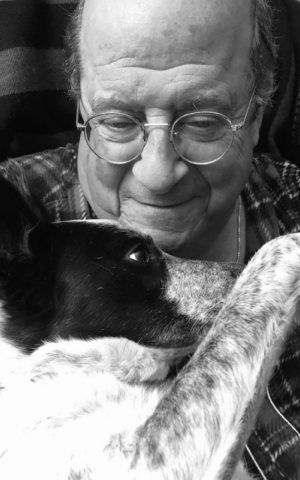Katz Worries How Pets are Becoming Our Children
The celebrated author of more than a dozen bestsellers on pets and people is concerned about the changing relationship we have with our animals.
For the last 20 years, Jon Katz has written about his love of animals and his life on his rural Bedlam Farm where he lives with three dogs, two cats, chickens, a flock of sheep, and a rescue donkey.
His bestsellers have included several books about his relationships with his dogs, as well as a commonsense guide to dog training, and two children’s books. Katz is also the author of a daily blog, Bedlam Farm Journal, that claims 3 million readers and a Facebook page with 56,000 followers.

Despite his success as the author of a string of bestsellers about the animals he’s encountered over the last two decades, he believes that the relationships that we have developed in recent years with our animals are not healthy for ourselves or our pets.
The AJT asked him, first, about what he sees as the role our pets have taken on recently.
Katz: Our society is tense and fragmented, and debate and politics has become a very ugly thing. And there’s a lot of hatred. I think people are turning to dogs for comfort and, you know, animals in general…people predicted back in the sixties that as we get more and more disconnected from religion and from community and from civic civility, we turn to dogs for companionship. And so, this is the new work of dogs. It’s the emotional lives of people. And a lot of people get love and affection from dogs, but they’re not getting from people.
Bahr: What’s wrong with that?
Katz: It’s great that dogs are doing this work and it’s great that they’re helping people, but it’s also dangerous because a lot of people, people I see, are losing the difference between human contact and animal contact. And I think that would be a tragedy for both dogs and people.
Bahr: But shouldn’t we give back the affection that our dogs and other pets seem so willing to give us.
Katz: It seems to be out of control. Last year, we spent over $136 billion on our pets, everything from gourmet dog food to dog clothing and funerals that can cost $1,000 or more. I think we have to be careful. I love dogs very much, but I don’t want them to replace human beings in our mind. They’re not our babies or they’re not our children. I have a child and I would not assume her by comparing them to an animal. I can’t tell you how many people told me that dogs were like children to them, and that would have been startling 15 years ago to hear that. So, I think we are losing perspective on that.
Bahr: Almost half of what we spend on our animals goes to their health care, often in the last years of their life, when some people go to extraordinary lengths to keep their animals alive. What is your view of that?
Katz: That’s just a loss of perspective. Veterinarians have told me again and again that the worst thing they see are people who just can’t let their dogs go when they get really sick. I heard of one woman — a woman who spent $17,000 on her pet when it had kidney troubles and she went bankrupt and the vet was begging her not to do that because…she kept saying, “No, no, I love her too much to let her go.” What she didn’t understand is dogs can’t speak for themselves, so they can’t agree to an elaborate surgery again and again and again. It can be very confusing for them and incredibly painful as well.

Bahr: So, you wrote a book on grieving about pets called, “Going Home – Finding Peace When Pets Die,” soon after you lost a beloved border collie. What did you learn from that?
Katz: And I learned a number of things. It is very important to have conversations with your vet in advance before you have to deal with the question of death. Think about how much money you want to spend and how much you’re willing to put the dogs through. As a Jew, I have read a lot about the sanctity of animals and the value of connection and the need to treat them carefully and with mercy. I respect the fact that dogs play a very, very powerful place in our lives. It’s great that they’re helping people, but it’s also dangerous because a lot of people I see are losing the difference between human contact and animal contact.




comments